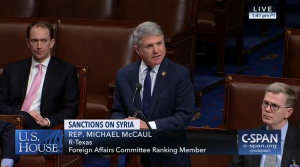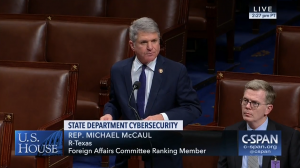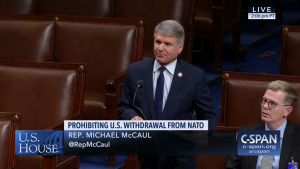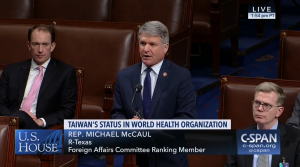ICYMI: McCaul Floor Remarks on 4 House-Passed Bills to Enhance Security & Reaffirm Partnerships with U.S. Allies
Washington D.C. – Today, House Foreign Affairs Committee lead Republican Michael McCaul (R-TX) gave the following remarks on four bills that enhance national security and reaffirm partnerships with our trusted allies. Specifically, these bills increase international pressure on Syria’s Assad regime, address cybersecurity concerns at the Department of State (DOS), reaffirm our support for NATO, and seek to regain observer status for Taiwan at the World Health Organization (WHO). These bills passed with overwhelming bipartisan support.
H.R. 31, Caesar Syria Civilian Protection Act of 2019, introduced by Rep. Eliot Engel (D-NY), to increase international pressure on Syria’s Assad regime by imposing sanctions and targeting their means of support.
To watch the full remarks on H.R. 31, click here.
To view the press release on the passage of H.R. 31, click here.
Ranking Member McCaul: “For nearly eight years, we have watched the barbaric Assad regime launch countless attacks on the people of Syria.”
“This bill is about creating leverage to push the parties to negotiate. It is about finding a way forward – to be determined by the Syrian people – that does not allow Assad to continue to exterminate them or drive them from their homes.”
“Today we send the strong message that the United States will work to ensure that Assad’s war machine is halted. It is not too late to act, but the people of Syria cannot afford further delay.”
H.R. 328 – Hack Your State Department Act, introduced by Rep. Ted Lieu (D-CA), to address lingering cybersecurity gaps at the Department of State.
To watch the full remarks on H.R. 328, click here.
Ranking Member McCaul: “Last September, the Department revealed that it recently suffered a breach of its unclassified email system which exposed the personal information of some of its employees.”
“The Department needs cost-effective solutions to these I.T. security challenges.”
“As a national security agency, the State Department must do more to secure its networks. The Hack Your State Department Act is a small but important step toward cost-effective solutions.”
H.R. 676, NATO Support Act, introduced by Rep. Jimmy Panetta (D-CA), to help address lingering cybersecurity gaps at the Department of State.
To watch the full remarks on H.R. 676, click here.
Ranking Member McCaul: “NATO was born out of the chaos of World War II and built to fortify European democracies against Soviet totalitarianism. Time and again, the alliance has proven that the free peoples of the world are strongest when they stand together.”
“An alliance of mutual defense is only as strong as each country’s commitment to its spending goals. While some member countries have made great strides toward this commitment, others are still lagging behind.”
“No statement about the importance of NATO speaks as loudly as the tangible commitment each country makes to ensuring the strength of the Alliance…I am glad to join this effort to reaffirm the continuing importance of NATO, which deserves our support.”
H.R. 353, To direct the Secretary of State to develop a strategy to regain observer status for Taiwan in the World Health Organization, introduced by Rep. Ted Yoho (R-FL).
To watch the full remarks on H.R. 353, click here.
Ranking Member McCaul: “Taiwan’s exclusion from the WHO is not just unfair, it is also dangerous. The world is more and more interconnected, and pandemics are a constantly growing threat that can cross borders at the speed of a jetliner.”
“Taiwan is a model democracy that makes the world better, while China is a revisionist authoritarian power that places the world at risk.”
###



